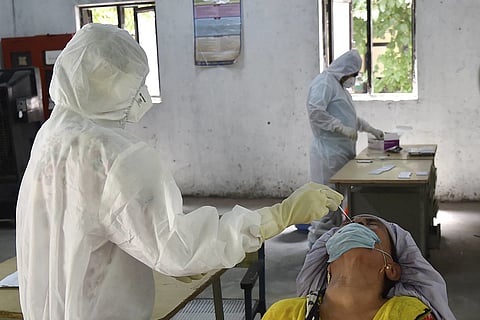

Fear of contracting SARS-CoV-2, the virus that causes COVID-19, has led to some individuals falling prey to the claims of unproven treatments. In one such instance, Dr Varun Cheruparambath, a cardiologist from Ernakulam’s Medical Trust Hospital in Kerala, took to Twitter to share the unfortunate story of how a healthy individual developed severe liver disease, days after drinking a herbal concoction. This concoction was allegedly sold by a person who claimed that it would prevent COVID-19.
Saw a very sick patient today with fulminant liver failure on ventilator who previously doing well and had no liver problems. After extensive work up the only history we could get was that he had taken a herbal concoction that claimed to prevent #covid.
— Varun (@drcheruvarun) June 16, 2020
According to a source at the Kochi hospital where the man was admitted, his liver function tests showed abnormal values and it was evident that his liver was not functioning. However, the man did not have any known or underlying liver ailments. Upon extensive inquiry, it was found that he had been taking a herbal concoction or kashayam, allegedly to prevent COVID-19.
The use of unregulated and unapproved drugs can be detrimental to health. However, in light of the pandemic, several doctors are noting that the fear of contracting the disease has been pushing some individuals to turn to these methods for protection.
“Please do not take unproven mixtures that make tall but bogus claims. False advertising is rampant and it is damaging people's health. Herbal remedies are not "harmless" and "natural",” wrote Dr Varun on Twitter.
Please, do not take unproven mixture that make tall but bogus claims. False advertising is rampant and it is damaging people's health. Herbal remedies are not "harmless" and "natural" as my friend @drabbyphilips will attest.
— Varun (@drcheruvarun) June 16, 2020
According to a study by some doctors in Kerala, the use of complementary and alternative medicine (CAM), which is largely seen in China and India, is associated with hepatotoxicity, or liver damage.
“CAM-related liver injury is among the major causes for hepatotoxicity, including acute liver failure (ALF) and acute on chronic liver failure (ACLF) worldwide, with a high incidence among Asian countries. Patient outcomes associated with CAM-DILI (drug-induced liver injury) are generally poor, with very high mortality rates among those with chronic liver disease,” noted the researchers.
Not just liver damage, but in some instances, the use of unregulated alternative treatments can also severely damage the kidneys, even among healthy individuals.
“We have had patients who have been diagnosed with acute kidney problems and start showing significant improvement with appropriate medications and treatments,” said Dr Srinivas, a consultant nephrologist from Apollo Hospital in Hyderabad.
However, the condition of these individuals starts deteriorating when they start taking herbal medicines, which can further damage the kidneys. “Many times, people begin some form of unregulated therapy. They might go to an unqualified physician or a quack who prescribes some herbal treatment or something they claim to be a natural cure. These treatments are often not tested or approved for use and tend to have the opposite effects and cause the kidneys to rapidly deteriorate that require urgent dialysis,” explained Dr Srinivas.
With the SARS-CoV-2 outbreak, health experts have noted that several people are capitalising on the fears among the public, selling unverified and illicit concoctions claiming it could prevent or cure COVID-19.
Earlier, in January, Dr Thanikasalam Veni, a Siddha practitioner from Chennai in Tamil Nadu, claimed that he had developed a herbal medicine that can “cure” COVID-19. He was later arrested for making these false claims on social media as well.
Several doctors and public health experts, too, have pointed out the serious danger posed by such treatments.
“It is understandable that people are afraid. However, by falling for such false claims of cure for COVID-19, people put themselves at risk of developing some other issue,” said Dr K Srinath Reddy, president of the Public Health Foundation of India (PHFI).
“The best practice is to follow all the advised precautionary measures. Practice appropriate physical distancing, wash your hands frequently, wear a face cover or mask when stepping outside. Though lockdown restrictions are being lifted slowly, the virus still poses a risk and we must take precautions,” he added.